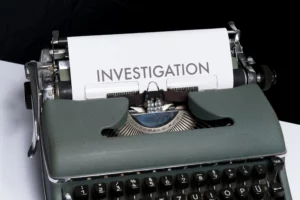Infidelity- it’s a word that can spark a range of emotions, from curiosity and suspicion to hurt and betrayal. Yet, despite these strong feelings, it remains a topic that’s often misunderstood or misrepresented in popular media. With the increasing complexity of relationships and evolving societal norms, the concept has also become more multifaceted. Consequently, when suspicions arise in a relationship, it’s crucial to approach the matter thoughtfully, ensuring respect for all parties involved and adherence to ethical guidelines.

In this guide, you will get a detailed look into the world of infidelity investigations. You’ll gain a comprehensive understanding of what infidelity is, how it’s investigated, and how to make sense of the results.
You might be reading this because you suspect your partner may be unfaithful, or perhaps you’re just intrigued by the investigative process. Regardless of your reason, knowledge is power. By understanding more, you can make better decisions, protect your interests, and find the clarity you need.
Understanding Infidelity
Defining Infidelity
Infidelity, also known as cheating or unfaithfulness, is commonly defined as a breach of the expectation of exclusive emotional and/or sexual intimacy within a relationship. However, the exact boundaries of what constitutes infidelity can vary significantly among different cultures, individuals, and relationships.
Causes and consequences
Research indicates various factors that may lead to it, such as dissatisfaction with the relationship, desire for novelty or variety, and opportunity. The consequences, too, are varied and significant, with emotional turmoil, broken trust, and relationship dissolution being common outcomes.
As we delve deeper into the topic of infidelity investigations, remember that it’s a sensitive subject. Approach it with a level of compassion and understanding, recognizing that every situation is unique.
What is an infidelity investigation?
Purpose
Basically, it’s a method used to determine if a person’s partner is unfaithful. These aim to uncover the truth behind suspicions or allegations, providing the person with tangible proof, whether it confirms or refutes their fears.
Who conducts them?
They can be done personally or by hiring a professional, often a private investigator. Although personal investigations may seem more economical, they can lead to bias and emotional distress. On the other hand, professional investigators offer a more objective and comprehensive investigation, ensuring privacy and legality throughout the process.
Signs of infidelity

Before delving into the intricacies of an investigation, it’s crucial to understand the signs that might necessitate one. These are often subtle changes in behavior, financial habits, or emotional connectedness that, when observed collectively, may indicate possible unfaithfulness.
These are not definitive proofs. They are, however, red flags that can justify further exploration.
Changes in behaviour
One of the earliest indicators of infidelity is a noticeable shift in behavior. It’s like your partner has transformed into a different person.
- Increased secrecy: This might involve your partner being overly protective of their phone or computer, changing passwords you once had access to, or getting defensive when asked about their day or plans.
- Changes in routine: Has there been a sudden, unexplained change in work hours? Are they taking more business trips or spending more time out with friends? Any significant change in routine warrants attention.
- Enhanced appearance: If your partner suddenly seems more invested in their appearance- hitting the gym more frequently, dressing differently, or even changing their grooming habit, it might be a sign worth noting.
Financial Indicators
Financial changes can often provide tangible signs of possible unfaithfulness. If your partner is suddenly spending more money or being secretive about their finances, you may have cause for concern:
- Unexplained expenses: Are there unusual or unaccounted charges on their credit card? Frequent large cash withdrawals? New subscriptions or memberships you weren’t aware of?
- Secretive financial behavior: If your partner becomes defensive when you ask about financial matters or starts to exclude you from financial decisions, it might be cause for concern.
Emotional Distance
Emotional distance is perhaps one of the most hurtful signs of potential infidelity. It’s harder to quantify than behavioral or financial changes, but equally important.
- Less communication: Are conversations with your partner becoming less frequent, less personal, or less engaging?
- Reduced intimacy: Is there a noticeable decline in physical contact, affection, or sexual activity?
- Increased conflict: Has there been a surge in arguments or a sense of constant tension in your relationship?
All these should be viewed as clues, not as evidence of cheating. They could also signal other issues such as stress, health problems, or personal dilemmas. However, if you find multiple signs persisting over time, it might be worth considering an investigation.
How to Proceed with an Infidelity Investigation

If you’ve noticed several signs of potential infidelity and decide to seek further clarity, you’re faced with a critical decision: should you embark on a personal investigation or should you enlist the help of a professional investigator? Each approach has its own merits and drawbacks, and it’s important to make a choice that aligns with your needs and circumstances.
Personal Investigation vs. Hiring a Professional
The choice between a personal investigation and hiring a professional often boils down to three factors: objectivity, resources, and legality.
1. Objectivity:
When conducting a personal investigation, maintaining objectivity can be challenging. The emotional investment in the relationship can cloud your judgment and make it difficult to interpret the facts impartially.
On the other hand, a professional investigator brings a level of detachment to the investigation, ensuring objectivity and impartiality in the collection and interpretation of evidence.
2. Resources:
You may not have the necessary tools or expertise to conduct a thorough and discreet investigation. This can limit the effectiveness of a personal investigation and potentially alert your partner to your suspicions.
Professional investigators, however, have access to advanced surveillance technology and databases, along with the training to effectively gather and analyze information.
3. Legality:
There are legal limitations to what you can do in the course of a personal investigation. These restrictions can hinder your ability to gather useful evidence, and crossing these boundaries can have severe legal consequences.
Professional investigators are aware of these legal boundaries and are trained to conduct investigations within the confines of the law.
Legal considerations
When proceeding with an investigation, it’s essential to respect privacy laws and ethical guidelines. For example, it’s illegal to hack into a partner’s phone or email, trespass on private property, or install surveillance devices without consent. The investigation should aim to uncover the truth without violating the rights or dignity of any individual involved.
It’s also crucial to consider the emotional impact of an investigation on all parties. The process can be stressful and challenging, so it’s vital to ensure you have the emotional support you need during this time. Consider speaking with a trusted friend, therapist, or counselor about your feelings and concerns.
Finally, if you decide to hire a professional, take the time to research their credentials, reviews, and professional standards. Ensure they conduct their investigations ethically, respecting both the legal boundaries and the emotional sensitivity of the situation.
The goal of the investigation isn’t to punish or expose, but to bring clarity and truth to light.
Steps involved

If you choose to work with a professional investigator, it’s important to understand the general process. Though each case is unique and the approach may differ, most infidelity investigations follow a series of steps:
Initial Consultation
The first step involves a confidential consultation. During this meeting, you’ll discuss your concerns, share any evidence you’ve already gathered, and set goals. The investigator will ask you a series of questions about your partner’s habits, routines, and any changes you’ve noticed. They’ll also provide you with an overview of the investigation process and discuss the costs involved.
Gathering Evidence
This is the core of the investigation. The investigator will collect evidence using various techniques, such as:
- Surveillance: This may involve physically following the subject, often at times when infidelity is suspected to occur. They may take photographs or videos as proof of any suspicious activities.
- Online Investigation: The investigator might examine the subject’s online presence, including social media profiles, forums, and other platforms, looking for any signs of infidelity.
- Asset Searches: If financial infidelity is suspected, the investigator may perform an asset search to find undisclosed financial assets or unexplained expenditures.
The investigator will maintain a detailed log of their activities and findings throughout the investigation process.
Surveillance Techniques
The specific surveillance techniques used will depend on your situation, the investigator’s expertise, and legal constraints:
- Physical Surveillance: This involves following the subject and documenting their activities. This can be done on foot or using a vehicle.
- Technical Surveillance: This could involve the use of surveillance cameras, GPS trackers, or other technology.
- Cyber Surveillance: This involves monitoring the subject’s online activity. Including social media activity, email exchanges, and other digital footprints.
Reporting Results
At the end of the investigation, he will provide you with a detailed report of their findings. This report will include a summary of the surveillance log, any photos or video evidence collected, and an analysis of the evidence in relation to your initial suspicions.
The results may not always be what you expect or hope for. Whatever the outcome, the investigator should handle the disclosure with sensitivity and discretion, providing you with the support and resources to help you navigate the next steps.
Case Studies
To better understand how an infidelity investigation unfolds in the real world, let’s consider a couple of case studies. While some identifying details have been altered for confidentiality reasons, these cases offer valuable insights into the investigation process, the type of evidence gathered, and the outcomes achieved.
Case Study 1: The Frequent Business Traveler
In this case, a woman named Jane grew suspicious when her husband, a business consultant, began taking more frequent trips and working late nights. His behavior had changed; he was now distant and secretive, particularly about his phone. Jane decided to hire a professional investigator to put her mind at ease.
He initiated surveillance, tailing Jane’s husband on a local ‘business trip’. Photos were taken of him with a female companion at various locations, including a romantic dinner at a high-end restaurant and checking into a luxury hotel.
After gathering enough evidence, the investigator presented Jane with a detailed report, allowing her to confront her husband about the affair.
Case Study 2: The Mysterious Expenses
John noticed his wife, a stay-at-home mom, had become increasingly private about her financial activities. Unexplained charges appeared on their credit card statements, and she was often vague about where she’d been during the day. Concerned, John contacted an investigator.
The investigator started with an asset search, revealing a secret credit card in the wife’s name. Surveillance followed, tailing her to a suburban house where she would spend several hours during the day. Further inquiries revealed that the house belonged to an old high school sweetheart of hers.
Armed with this evidence, John was able to have an open conversation with his wife about their relationship and her secret life.
Final Thoughts

Having an infidelity investigation conducted is a major decision, and dealing with the results, whether they confirm or dispel your suspicions, is often emotionally challenging. Here are a few suggestions to help you navigate this difficult period:
If infidelity is confirmed
If your worst fears are confirmed, it’s crucial to allow yourself time to process this information. You may feel a range of emotions, including anger, sadness, betrayal, and confusion, all of which are entirely natural. Consider seeking support from a trusted friend, family member, or mental health professional to help navigate your feelings.
Also, it may be helpful to seek legal advice, especially if you’re considering separation or divorce. A lawyer can provide guidance on how the evidence from the investigation might impact divorce proceedings, custody issues, or financial settlements.
If infidelity is disproved
If the investigation results disprove your suspicions, you may feel a mix of relief and guilt. It’s important to use this as an opportunity to improve communication and trust in your relationship.
- Open Dialogue: Have a heart-to-heart talk with your partner. Discuss your suspicions and fears that led to the investigation. Honesty can lead to a deeper understanding between you both.
- Seek Counseling: Consider seeking couples counseling. A professional counselor can provide tools and techniques to improve communication, trust, and mutual understanding.
- Self-Reflection: Examine what led you to suspect infidelity in the first place. Were there elements of your relationship that need attention? Were your fears rooted in past experiences or insecurities? Reflecting on these questions can lead to personal growth and healthier relationships.
Regardless of the investigation’s outcome, remember that the purpose of this process was to seek clarity and truth. Whatever the findings, you’ve taken a brave step towards understanding and resolution. Moving forward may be challenging, but with time, support, and self-care, you can navigate this journey toward healing and growth.
Infidelity investigations can be emotionally charged and complex. This guide aims to provide you with a comprehensive understanding of the process, helping you make informed decisions every step of the way. Remember you are not alone, and there are resources and professionals ready to support you throughout this challenging period.

